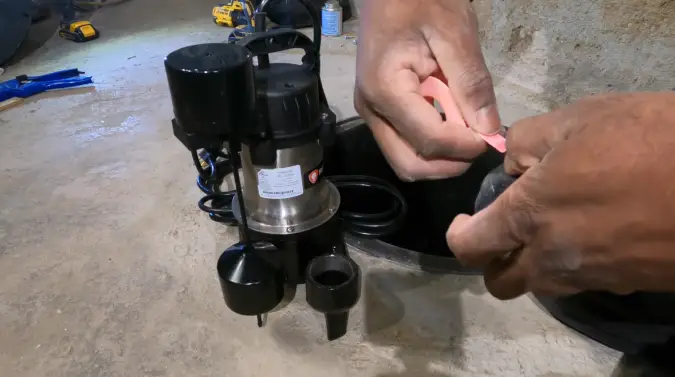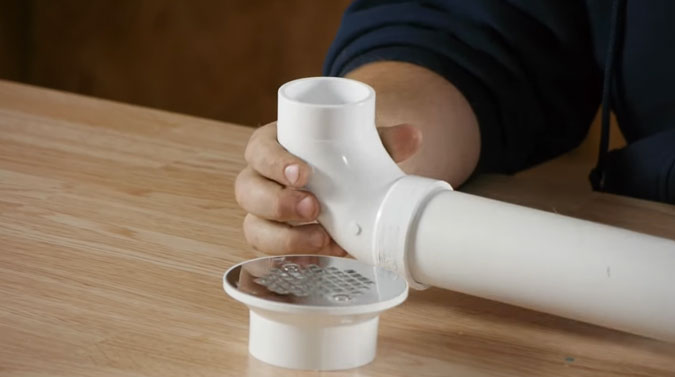Last Updated on May 24, 2023
Are you plagued by a sump pump spraying water all over your basement? Many homeowners experience this issue, which can become a severe problem if not addressed quickly. Now the question is, why is a sump pump spraying water?
Fortunately, several possible causes exist, so you don’t need to panic. A few things can cause a sump pump to not work properly.
Damaged check valves, clogged pipes, the wrong size of pipes, damaged parts in the discharge lines, incorrect installation, float switches that don’t work right, high water pressure and too much water in the sump pit can all be behind the problem.
Here, we’ll explore these potential causes to help you determine why a sump pump may spray water and how to fix the problem. Let’s get started.
Why Is My Sump Pump Spraying Water: Reasons Behind Why?

A sump pump is essential equipment that helps keep basements and crawl spaces dry by removing water from the area. When a sump pump begins to spray water, it can cause serious damage to homeowners and their property.
There are possible reasons and solutions:
01: Damaged or Malfunctioning Check Valve
A damaged or malfunctioning check valve can lead to your sump pump spraying water. When the check valve is not functioning correctly, water from the sump pit can flow back into the pump and cause it to spray water.
Inspecting and maintaining your sump pump’s check valve regularly is essential to prevent this. This can include checking for any broken components, debris buildup, or corrosion that could prevent the valve from sealing properly.
Ensuring the valve is correctly sized for your system is also essential. A qualified professional should be consulted to repair or replace damaged parts if necessary.
02: Clogged Discharge Pipe
Clogging in your sump pump’s discharge pipe can also be a major cause of spray. Debris, such as dirt and leaves, may accumulate in the pipe over time, blocking off the normal flow of water and increasing pressure on the sump pump.
To prevent this problem, it is essential to clear out any debris regularly, using either a brush or shop vac if necessary. And you should ensure that all connections are tightly sealed to ensure proper water flow through the discharge pipe without any leaks or blockages.
03: Incorrectly Sized Discharge Pipe
If a discharge pipe that is too small for your system’s needs is connected to your sump pump, this can result in excessive pressure and spray. This is because there may not be enough space for all the water being pumped out of the pit to escape through the discharge pipe successfully.
To remedy this issue, you should consider replacing your existing discharge pipe with one that is adequately sized for your needs. It should be large enough so the pumped-out water can exit quickly and efficiently without becoming backed up due to insufficient room inside.
Also, if you are unsure what size discharge pipe would work best for you and your system’s specific needs, consulting a professional can provide helpful insight into which option would be most suitable based on its size and configuration requirements.
04: Damaged Impeller or Discharge Line

Another leading cause of a sump pump spraying water is the impeller or discharge line damage. When an impeller becomes damaged, it cannot effectively push water through the pump and out of the sump.
This can result in pressure buildup in the pump, eventually leading to water spraying out.
And if there is damage to the discharge line, it can impede the water flow and cause it to spray out of the pump. To fix this issue, a new impeller should be installed and any damage to the discharge line should be repaired.
05: Incorrect Installation
Another common reason for water spraying from a sump pump is incorrect installation.
If the pump was not installed properly, there could be issues with either the discharge line or the seal around the pit where it was installed. If there are gaps in these components, then water can escape and spray from the pump.
To prevent this from occurring, make sure that your sump pump is installed according to manufacturer instructions. And if you’re unsure how to do it yourself, hire a professional to ensure the installation is done properly.
06: Faulty Float Switch
A faulty float switch is another potential cause for a sump pump spraying water. The float switch detects when there is excess water in your sump pit and will turn on your sump pump when necessary.
If this component malfunctions or gets stuck in one position, your sump pump may run continuously, leading to excessive pressure and water spraying from the unit.
To fix this issue, check if your float switch needs replacing or servicing and follow any manufacturer instructions on how to do so correctly and safely.
07: High Water Pressure

It can be one of the major reasons why a sump pump is spraying water. It can be caused due to an issue with the pressure relief valve not functioning correctly, allowing too much pressure to build up in the system. This will cause the pump to struggle and spray water to reduce the pressure.
Another potential issue could be an over-pressurized municipal supply line that is causing too much pressure on the plumbing system. This can also create issues for a sump pump and lead to it spraying water.
To address this problem, checking and inspecting the pressure relief valve for proper operation is vital. If it isn’t functioning correctly, it must be repaired or replaced.
It is also essential to check for any other issues related to the water supply that could be causing excessive amounts of pressure on the system. Contact a qualified plumber to investigate and resolve possible plumbing issues if needed.
08: Excessive Water in the Sump Pit
If too much water is present in a sump pit, then this can also create problems for a sump pump. Heavy rainfall or flooding are possible causes of excess water in a sump pit. This will put too much strain on the pump, which will spray out water as the device attempts to relieve some of its workloads.
To address this issue, it’s essential to make sure that gutters are cleaned regularly and downspouts are directed away from the house foundation so that excessive amounts of rainwater don’t enter into your sump pit.
And you may want to install backflow valves or check valves near your home’s foundation walls so that any excess groundwater doesn’t flow into your basement or crawl space areas.
Also, you should ensure that all drainage systems used around your home (such as catch basins) are clear of any debris or obstructions that could prevent proper draining.
How do you prevent sump pumps from spraying water?
It is crucial to ensure proper installation and regular maintenance to prevent a sump pump from spraying water. Proper installation should include mounting the sump pump in the correct location on a stable surface, such as a concrete floor or bed of gravel.
The discharge line should be checked for any blockages or obstructions that can cause resistance and create back pressure. A check valve should also be installed in the outlet pipe to maintain a one-way flow and avoid reverse suction when the pump is not running.
Also, using a high-quality pump with a good capacity rating and designed for sump applications will help ensure reliable operation and reduce wear over time. Finally, regularly testing your pump by turning it on and off several times will detect any issues with the system before they become too severe.
Does Your Sump Pump Spray Water Through the Weep Hole and is That Normal?

When operating correctly, it is normal for some water to spray out of a sump pump’s weep hole. The weep hole allows air trapped inside the system to escape during operation and can create a light spray if drilled at an angle or too large of a size.
To prevent excessive spraying, ensure that the weep hole is drilled at an appropriate angle according to the manufacturer’s specifications and that its size matches what is recommended.
Also, installing the check valve close enough not to create too much back pressure on the outlet pipe will help reduce excessive spraying from the weep hole.
Should water be spraying out of the bottom of the sump pump?
A sump pump has a float switch inside the pit which activates when the water rises to a certain level. When this happens, the sump pump will start working and draw out any additional water.
While it is perfectly normal for some water to be present in the pit due to rain, snowmelt, or seepage from the ground, excessive spraying of water from the bottom of your sump pump can indicate that something is wrong.
This may be due to the incorrect size of its weep hole, an incorrect angle when drilling it, or if it was drilled at a different distance from the check valve or water line respectively.
Don’t Let Your Sump Pump Become a Flooding Hazard
Sump pumps are essential for keeping your basement dry during heavy rain or flooding. Unfortunately, your sump pump system can spray water all over your basement when something goes wrong.
To prevent long-term damage from occurring due to the excess moisture and potential mold growth that comes from a malfunctioning sump pump system, it’s important to inspect each system component regularly and address any issues as soon as they arise.
From damaged check valves to clogged discharge pipes and faulty float switches, there are many reasons your sump pump could spray water throughout your home. Knowing these potential issues can help you ensure that your sump pump is functioning properly.


